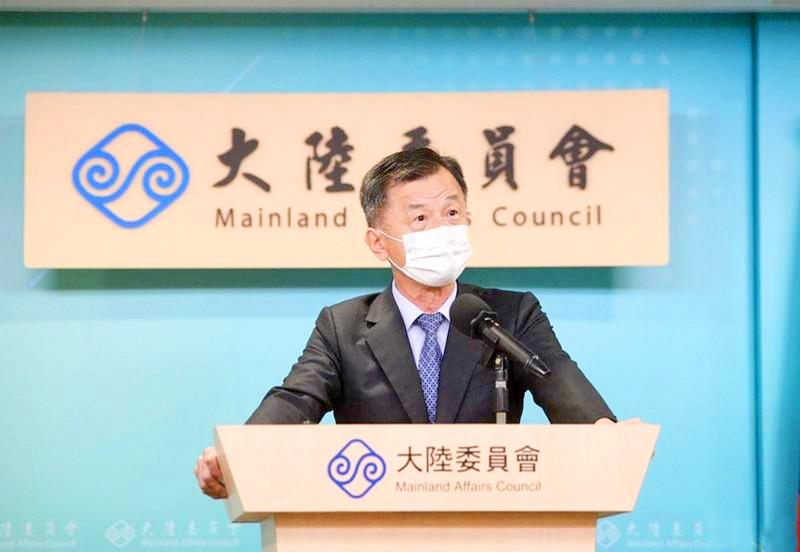China is likely to use a version of its “one country, two systems” framework designed for Taiwan to legitimize use of force against the country, Mainland Affairs Council (MAC) Minister Chiu Tai-san (邱太三) said.
Chiu was speaking at a meeting on Thursday, at which the council’s advisory committee discussed possible responses in the event that the Chinese Communist Party (CCP) sought to legitimize an invasion of Taiwan and mitigate any international response by invoking the framework.
The CCP first announced the Taiwan version of the framework in 2019, when it hoped to use the proposal as a basis for political negotiations with Taiwan, he said.

Photo: Chen Yu-fu, Liberty Times
In a report issued after the meeting, a researcher who asked to remain anonymous was cited as saying that the CCP has had to restructure its plans for the implementation of the Taiwan framework due to deteriorating US-China relations, the protests in Hong Kong and the COVID-19 pandemic.
Due to failures of the original “one country, two systems” framework designed for Hong Kong, China would redesign it for Taiwan, putting more emphasis on “one country,” while ensuring effective central control over the “two systems” to avoid social division, the researcher said.
The CCP would “localize” Taiwan in its laws, referring to it as a region of China, and would “internalize” cross-strait relations, they said, adding that the government should devise response measures.
Some committee members cited in the report said they believed that China had switched gears regarding Taiwan, because of the sanctions placed on Russia after it invaded Ukraine.
Fearing similar sanctions, China would attempt to legitimize its actions toward Taiwan using its laws, they said.
Recently, China’s “united front” efforts have focused on blocking any representation of Taiwan as an independent country internationally, as well as manipulating Taiwanese into working as collaborators, they said.
The CCP is likely to reiterate Chinese President Xi Jinping’s (習近平) “five points” on Taiwan at the 20th National Congress to be held later this year, which includes the Taiwan framework, they said.
Xi first introduced the five points in January 2019 when he said China would promote “peaceful unification” with Taiwan that “would fully respect Taiwanese compatriots’ way of life and guarantee their properties, religious beliefs and legitimate rights.”

ANOTHER EMERGES: The CWA yesterday said this year’s fourth storm of the typhoon season had formed in the South China Sea, but was not expected to affect Taiwan Tropical Storm Gaemi has intensified slightly as it heads toward Taiwan, where it is expected to affect the country in the coming days, the Central Weather Administration (CWA) said yesterday. As of 8am yesterday, the 120km-radius storm was 800km southeast of Oluanpi (鵝鑾鼻), Taiwan’s southernmost tip, moving at 9kph northwest, the agency said. A sea warning for Gaemi could be issued tonight at the earliest, it said, adding that the storm is projected to be closest to Taiwan on Wednesday or Thursday. Gaemi’s potential effect on Taiwan remains unclear, as that would depend on its direction, radius and intensity, forecasters said. Former Weather Forecast

As COVID-19 cases in Japan have been increasing for 10 consecutive weeks, people should get vaccinated before visiting the nation, the Centers for Disease Control (CDC) said. The centers reported 773 hospitalizations and 124 deaths related to COVID-19 in Taiwan last week. CDC Epidemic Intelligence Center Director Guo Hung-wei (郭宏偉) on Tuesday said the number of weekly COVID-19 cases reported in Japan has been increasing since mid-May and surpassed 55,000 cases from July 8 to July 14. The average number of COVID-19 patients at Japan’s healthcare facilities that week was also 1.39 times that of the week before and KP.3 is the dominant

The Chinese Communist Party’s (CCP) working group for Taiwan-related policies is likely to be upgraded to a committee-level body, a report commissioned by the Mainland Affairs Council (MAC) said. As Chinese President Xi Jinping (習近平) is increasingly likely to upgrade the CCP’s Central Leading Group for Taiwan Affairs, Taiwanese authorities should prepare by researching Xi and the CCP, the report said. At the third plenary session of the 20th Central Committee of the CCP, which ended on Thursday last week, the party set a target of 2029 for the completion of some tasks, meaning that Xi is likely preparing to

US-CHINA TRADE DISPUTE: Despite Beijing’s offer of preferential treatment, the lure of China has dimmed as Taiwanese and international investors move out Japan and the US have become the favored destinations for Taiwanese graduates as China’s attraction has waned over the years, the Ministry of Labor said. According to the ministry’s latest income and employment advisory published this month, 3,215 Taiwanese university graduates from the class of 2020 went to Japan, surpassing for the first time the 2,881 graduates who went to China. A total of 2,300 graduates from the class of 2021 went to the US, compared with the 2,262 who went to China, the document showed. The trend continued for the class of 2023, of whom 1,460 went to Japan, 1,334 went to